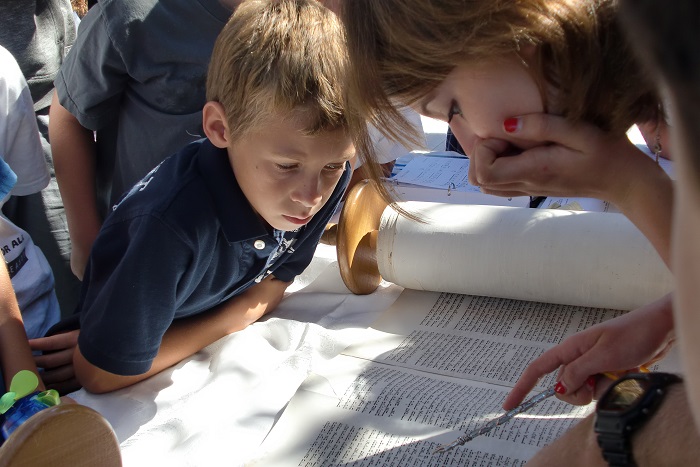
As a people with agricultural roots, Jews have found many ways to mark the seasonal and environmental changes that occur throughout the year. Sukkot has numerous themes that encompass seasonal, historical, and theological perspectives. It is among the festivals that fall in the Hebrew month of , emphasizing the cycles of the earth and the cycles of Jewish life. (The other holidays in Tishrei are Rosh HaShanah, Yom Kippur, and Simchat Torah.)
Sukkot concludes with the celebration of Simchat Torah, when Jews mark the cycle of readings by finishing the Book of Deuteronomy and immediately beginning the Book of Genesis. This practice reminds us of the constant need to study all that Torah has to offer, including teachings about social justice and righteousness.
You can incorporate social action themes into your Sukkot and Simchat Torah celebrations in the following ways:
WELCOME SOCIAL JUSTICE USHPIZIN INTO YOUR SUKKAH
Jewish tradition encourages us to welcome seven holy guests () into our sukkah, one for each night of the week. In a modern variation to this custom, each night can be connected to a social action theme. Use this discussion guide to lead your family in a discussion about this tradition as it relates to modern social justice issues.
Consider expanding on this tradition by aiding newly arrived refugees to your community. Wondering what’s involved in serving new refugees? Check out this resource from HIAS. You can partner with a local resettlement agency and learn more on the RAC’s immigration justice page.
FOCUS ON HOUSING ISSUES
Sukkot can provide an opportunity to converse about housing issues and homelessness. On Sukkot, we are commanded to live in temporary booths for seven days to remind us of when our wandering ancestors had to dwell in following the Exodus from Egypt. This remembrance naturally draws to mind those who are experiencing homelessness or who must live in temporary housing all year round.
Volunteer with Habitat for Humanity or another local housing initiative during the week of Sukkot to help build affordable housing for and with people in need. You can also advocate for a living wage alongside the RAC, helping employees keep up with the cost of housing. The cost of housing has risen at historically high rates, outpacing wage growth. Workers being paid the federal minimum wage and working 40 hours per week, 52 weeks a year, earn less than the federal poverty limit for a family of two. Many individuals who are paid the federal minimum wage are often supporting more than just one other person.
MAKE A RECYCLED SUKKAH
The seven days spent in the sukkah allow for closer interaction with the environment in a way that permanent homes do not. Eating and sleeping in sukkot create a connection with the wind, air, sun, moon, and stars. Such an encounter with the natural world during this season can inspire us to pay closer attention to environmental issues.
Use as many recycled materials as possible when building a sukkah. This can promote the importance of buying and using environmentally sustainable products.
Join us in calling on Congress to pass legislation that challenges environmental racism, integrates environmental justice into decisions made under the Clean Water Act and Clean Air Act, and invests in communities that have historically been fossil fuel-dependent.
HONOR FARMERS AND FARM WORKERS
Sukkot is an excellent opportunity to honor those who provide us with healthy food throughout the year.
- Invite a local farmer or farm worker to your sukkah and ask them to speak about the challenges of growing healthy food in the local ecosystem.
- A farm worker might be invited to speak about the difficulties of working around pesticides and the dangers of poor working conditions.
- Invite other guests to your sukkah to honor them for their justice work in the community.
HOST AN AUTUMN WARM-UP CLOTHING DRIVE
Sukkot often signals the end of summer and the beginning of cooler seasons. A clothing drive held as the weather gets colder is a simple yet very important .
Help make the winter months warmer for someone in need by collecting new or gently used coats, gloves, hats, mittens, wool socks, and other warm clothing during Sukkot. Contact local shelters to see where your donations are most needed.
DECORATE AND DONATE
While we are commanded to rejoice abundantly at this time of year, we also must assist others who are in financial need. According to the Jewish scholar Maimonides, proper observance of Sukkot requires feeding those who are in need. Hunger and poverty were facts of life in Maimonides’ time and, unfortunately, continue to be major concerns.
- Hold a Sukkot potluck event to celebrate the holiday, help the hungry in your community, and even raise awareness of local farmers' needs.
- Encourage guests to support local farmers by using locally grown produce for their dishes and bring a bag of some other locally grown produce to be donated to those in need.
ENGAGE IN INTERFAITH or INTERCOMMUNITY DIALOGUE
In Temple times, Jews sacrificed 70 bulls during the week of Sukkot to atone for sins on behalf of the “70 nations” of the world. This tradition demonstrates the importance of praying and acting for the well being of all nations.
Sukkot is an excellent time to build and strengthen relationships across religious and cultural communities, sharing traditions, learning about each other's community, and exploring our commonalities and differences.
ADOPT A PARK
As Sukkot inspires us to appreciate the natural world around us, we become more aware of our responsibility to keep nature beautiful and clean. With friends, family, or fellow synagogue members, “adopt” a local park, street, beach, lake, river, or other natural land, and take responsibility for cleaning up that area. The project can start during the week of Sukkot and continue throughout the year.